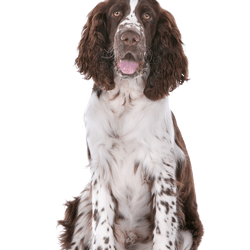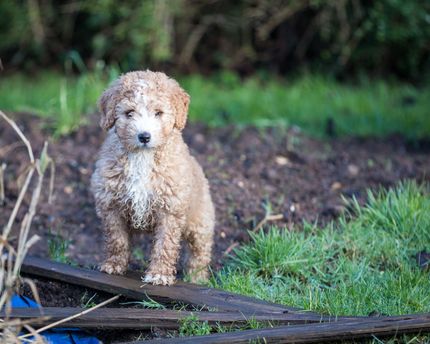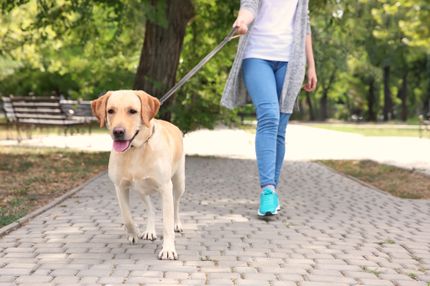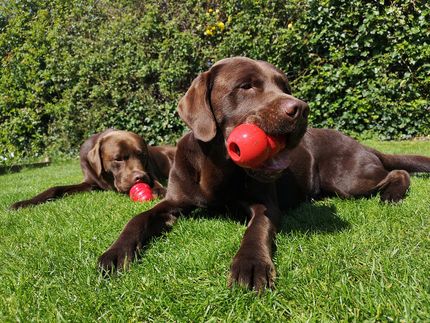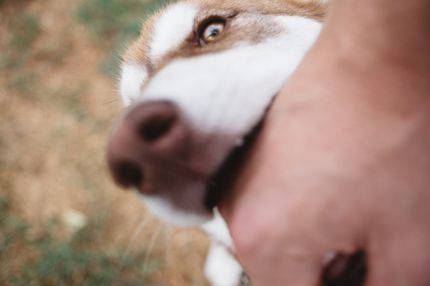Facts & Origin
Springer Spaniel and Poodle in one
The Springerdoodle is a deliberately bred hybrid breed, created by crossing an English Springer Spaniel with a Poodle - usually a Miniature or Standard Poodle. The idea behind this cross was to create an active, intelligent and family-friendly dog with as little shedding as possible.
This crossbreed became particularly popular in North America, where "doodle" mixes are known for their eagerness to learn, versatility and a coat that is considered allergy-friendly. The Springerdoodle was intended to combine the Springer Spaniel's willingness to work and friendly character with the intelligence and coat structure of the Poodle.
Name synonyms for the Springerdoodle
In addition to Springerdoodle, one occasionally also finds names such as Springerpoo, Springer Poodle Mix or Spaniel Doodle. The exact name varies depending on the region or breeder, but it always refers to the cross between an English Springer Spaniel and a Poodle.
Criticism of the Springerdoodle
As with many designer dogs, there is also criticism of the Springerdoodle - particularly because it consists of two breeds with very different temperaments and grooming requirements. While the Springer Spaniel is a passionate, sometimes tireless working dog, the Poodle is highly intelligent, but also sensitive and requires a lot of mental exercise.
In addition, the typical doodle argument of the "hypoallergenic coat" is misleading: although many Springerdoodles shed less than their spaniel parents, they can still trigger allergies. The coat can also vary greatly in density and texture and requires regular grooming in any case.
Suitability of the Springerdoodle
When kept correctly, the Springerdoodle is a friendly, active and versatile companion that is suitable for both sporty families and individuals who enjoy exercise, play and mental activity. It needs loving but consistent training and benefits from tasks - be it dog sports, retrieving or trick training.
The Springerdoodle is less suitable for people who are looking for an uncomplicated sofa dog or have little time for grooming and exercise. However, anyone who enjoys a clever, loyal and active dog will find a loyal companion with lots of potential.
| Alternate Name | Springerpoo, Spaniel Doodle |
| Origin | UK - Germany |
| Life expectancy | 12 - 15 years |
| Care requirements | high-maintenance |
| Activity level | average to high |
| FCI group | not recognised |
| AKC group | not recognised |
| KC group | not recognised |
More Springer Spaniel mixes
More Poodle mixes
Attitude, character and temperament of the breed
Possible character traits of the Springerdoodle
The Springerdoodle is generally a lively, intelligent and very people-oriented dog. It often has the willingness to work and agility of the English Springer Spaniel, coupled with the cleverness and "will to please" of the Poodle. This combination makes him particularly eager to learn, active and versatile.
It is well suited to families, is friendly towards children and is usually open towards other dogs. At the same time, he can become restless, pushy or over-excited, especially if he is not given enough exercise. Structure, variety and calm, clear handling are important to keep him balanced. Particularly positive: Many Springerdoodles have a strong bond with their caregivers and enjoy working with humans.
Character
Usage
Possible diseases of the Springerdoodle
As with all mixed breeds, genetic health risks can also occur in the Springerdoodle. These include hip dysplasia, elbow dysplasia and eye diseases such as progressive retinal atrophy (PRA) or cataracts - diseases that can occur in both parents.
Ear infections are also not uncommon in this breed, as the Springerdoodle often has drooping ears that allow little air circulation. In addition, the sometimes dense, curly coat needs regular grooming to avoid skin problems, matting or parasite infestation. With responsible breeding, good care and regular veterinary checks, many of these risks can be well managed.
This is what a Springerdoodle can look like
Visually, the Springerdoodle is somewhere between its parents: it is usually medium-sized, around 40 to 55 cm high, weighing between 15 and 25 kilograms - depending on whether a Miniature or Standard Poodle has been crossed with it.
The coat can be wavy to curly, is often of medium length and dense. Many Springerdoodles shed very little, but require regular brushing and occasional trimming. A wide range of colors is possible - from black, brown, cream and white to multi-colored varieties with typical spaniel markings.
The eyes are usually expressive and alert, the ears droopy, the body athletic and well proportioned. Overall, the Springerdoodle gives the impression of a friendly, intelligent and very active family dog that has a lot of charisma both visually and in terms of character.
| Fur length | medium |
| Fur | curly |
| Ear shape | Floppy Ear |
| Tail | fanned out - lang |
| Anatomy | slim, slim, sporty |
| Size ♀ | 45 - 60 cm |
| Weight ♀ | 18 - 28 kg |
| Size ♂ | 45 - 60 cm |
| Weight ♂ | 18 - 28 kg |
| Suitable For | - |
Known Diseases
Epilepsy
Definition: Dog has epilepsy if, for example, at least two epileptic seizures occur more than 24 hours apart.
Cataract
Cataracts are still one of the most common causes of blindness, even in dogs.
Progressive Retinal Atrophy (PRA)
Progressive retinal atrophy (PRA) is a slowly progressive death of the retina in dogs.
Patellar problems
Problems with the Patellar can be a displacement or weak kneecap, which is one of the most common causes of lameness in dogs, also because of overweight.
Eye diseases
Often occur with allergies and intolerances.
FAQ
-
A Springerdoodle is a cross between a Springer Spaniel and a Poodle. The result is a friendly, intelligent and active dog that gets on well with families and other pets.
-
The average life expectancy of a Springerdoodle is 12 to 15 years.
-
The size varies depending on the type of Poodle used. Most Springerdoodles are medium sized, around 40-55 cm shoulder height and weigh 15-25 kg.
-
Partly. He is friendly and willing to learn, but also needs clear leadership and daily exercise. If you are prepared to invest time in training and activity, you can get on well with him.
-
Yes, if he has been well socialized, he is friendly, playful and patient, even with children. Early training and clear rules help to create a harmonious family life.
